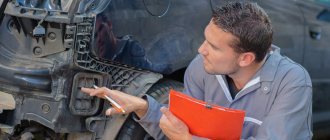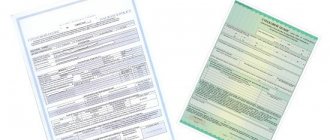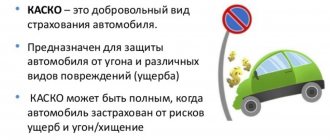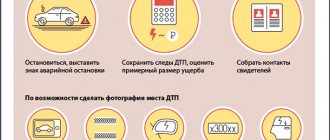In accordance with the Federal Law “On the organization of insurance business in the Russian Federation”, if an insured event occurs under a CASCO policy, the insurer can replace the cash payment with compensation for the costs of repairing the vehicle.
The conditions for restoring the car are specified in the contract concluded between the company and the client.
You should carefully read all the nuances of the document before signing it, especially with the terms of compensation in the form of repairs under CASCO.
Peculiarities
The main distinctive feature of insurance compensation under CASCO in the form of car restoration at a service station is the lack of clear regulation of the timing of repairs in regulations.
Unscrupulous insurers can take advantage of this by delaying restoration work.
On the other hand, in some cases, repairs are preferable to cash payments .
For example, if the car is insured taking into account wear and tear, if you choose to have it restored at a service station, you will not have to pay extra for new spare parts.
Will body repairs be carried out if the driver himself is at fault?
In most cases, the insurance company compensates for the damage, even if the policyholder himself is to blame for the damage to the car. However, there are a number of reasons for refusing to carry out repairs:
- the vehicle was damaged intentionally in order to obtain payment;
- the driver is not included in the CASCO policy;
- the person driving the car was intoxicated or grossly violated other traffic rules;
- The car, known to the owner, was in a faulty condition, which could have caused the accident.
When should the owner demand that the insurance company replace the part?
Elimination of damage by replacing rather than repairing a part (bumper, glass, including windshield, etc.) is possible in the following cases:
- the malfunction cannot be eliminated due to technical reasons;
- the damaged body, cabin or frame of the vehicle does not meet the requirements for acceptance for repairs;
- structural elements and stiffeners are complexly deformed;
- parts have damage, the elimination of which is impractical from a technological or economic point of view.
Conditions after a traffic accident
The conditions for repairs under CASCO are specified in the insurance rules . To obtain compensation for damage, a number of conditions must be met:
- The event that occurs is recognized as an insured event. To do this, the policyholder must provide the company with:
- documents confirming the occurrence of an insured event;
- evidence of interest in preserving the vehicle insured under the contract;
- confirmation of damage.
- The policyholder fulfilled its obligations under the contract in full. If payment of the insurance premium in installments was discussed, then the cost of repairs is calculated minus the unpaid part.
- At the time of the event, the insurance contract was valid.
Is it possible to get it if the damage is not confirmed by a certificate of an accident?
In cases provided for by insurance rules, you can receive compensation, including through repairs, without providing a certificate of an accident.
To do this, you need to present the vehicle for inspection by an employee of the insurance company.
Typically,
a simplified procedure for accepting payment documents applies in case of minor damage :
- if the paintwork of one or two body elements is damaged;
- if parts such as headlights, glass, mirrors, antenna are damaged;
- if the amount of insurance compensation is no more than 3% of the insured amount (regardless of the amount of damage).
The number of such requests is limited to 1-2 times during the policy period.
Will they repair cars with damage not caused by an accident or caused by third parties?
If the car is damaged as a result of illegal actions of third parties, the insurance company will send it for repair if all supporting documents are provided. In this case you will need:
- a certificate from the police department or from a local police officer, to whom you will need to contact with a statement about the offense committed;
- a copy of the resolution to initiate a criminal case (or refusal to initiate one).
Are there damage limits: do they carry out minor repairs to chips/scratches?
In case of minor damage to the car, it is more profitable to agree to monetary compensation , if such an option is provided for in the insurance contract.
Repair is also possible, but it is likely that it will take a long period of time, although the owner could continue to use the vehicle during this time and restore it himself or in a workshop of his choice in a shorter period of time.
Important! The voluntary car insurance contract does not provide for compensation for minor damage to the paintwork as a result of wear and tear.
What documents are needed
To receive a referral for repairs, you must provide a number of documents to the insurance company, which depends on the type of insured event.
In any situation you will need:
- a valid CASCO policy and a receipt for payment of the cost of the insurance policy;
- civil passport of the car owner;
- registration documents for the vehicle (PTS, STS);
- driver's license of the person driving the car at the time of the accident;
- diagnostic card confirming the serviceability of the insured vehicle.
If the damage is caused by a road accident, then additionally the following is provided:
- Certificate of participation in a road accident. The documents establish the fact of the accident, the parties involved and the damage received.
- Information about the incident. The document reflects data about the drivers and vehicles involved in the accident. The documents drawn up and the damage received are also indicated.
- Copies of the protocol and resolution on the administrative offense committed (provided if such documents were drawn up). These documents can be replaced by a notification of an accident (European protocol).
- Copies of documents confirming the refusal to initiate an administrative case (the document is provided if a protocol was not drawn up at the scene of the road accident).
If the damage to the car was caused by illegal actions of third parties (repair under CASCO without an accident), then the car insurer is provided with:
- Notification from the Department of Internal Affairs about the occurrence of an insurance situation.
- A certificate from the Department of Internal Affairs confirming the circumstances of the occurrence of the insured event and the presence of damage.
- Documents confirming the initiation or refusal to initiate a criminal case.
If the damage was received under other circumstances, then the following is provided:
- certificate from the Hydrometeorological Service (natural disaster);
- a certificate from the fire inspectorate and a fire report (fire);
- certificates from the relevant authorities (man-made accidents, pipeline accidents, etc.).
If the insurance contract provides for the possibility of repairs under CASCO without certificates, then in order to receive a referral for restoration repairs, only a standard set of documents is provided.
Rules and laws
Voluntary types of insurance, which include CASCO, are regulated by the provisions of several legislative acts. Among them:
- Federal Law “On the organization of insurance business in the Russian Federation”.
- Federal Law “On Protection of Consumer Rights”.
- Civil Code of the Russian Federation.
- Resolutions of the Plenum of the Supreme Court (for example, Resolution No. 20 of June 27, 2013).
There is no separate regulatory act regulating the conditions for the provision of voluntary transport insurance services.
The main documents regulating the relationship between the insurance company and the client are the insurance contract and rules. They vary from company to company, but generally may not conflict with federal law.
Is it possible to choose which service will provide the service?
When concluding a voluntary insurance contract, all conditions for possible compensation for damage are discussed .
Typically, the insurance company offers three compensation options:
- monetary compensation (cost of spare parts and work to restore the vehicle);
- repairs directed by the insurer;
- repairs at a service station of the policyholder's choice.
Attention! A separate item is the restoration of a car that is under warranty from an official dealer.
How is the type of compensation selected? The policyholder can specify any of the options presented. The choice of the type of compensation is made at the stage of registering a CASCO policy.
If the contract specifies only repairs directed by the insurer, then in most cases it will not be possible to choose the service yourself .
However, if the insurance company violates the deadlines for completing restoration work, the policyholder will be able to choose a service station himself, and then recover the losses incurred from the insurer.
Will a replacement car be provided?
In accordance with Part 2 of Art. 20 of the Federal Law “On the Protection of Consumer Rights”, when repairing a durable product, the owner is provided with a similar one for a while.
However, there is a list of exceptions established by Decree of the Government of the Russian Federation No. 55 of January 19, 1998, and vehicles are included specifically in them.
But the possibility of getting a replacement car during repairs still exists in the following cases:
- This condition is provided for in the insurance contract.
- The car is under warranty and the official dealer is ready to provide a replacement. Often this service is paid, and the insurance company does not compensate for its cost.
Time standards
The maximum period for repairs is not regulated by law .
It is only stated that it must be “reasonable”.
What is the maximum time frame for restoration repairs? The insurance company's rules must indicate the duration of the work (usually from 15 to 45 days).
In case of serious damage to the car, it makes sense to wait a month for restoration work at an official dealer, in other cases - up to a month and a half.
How long should I wait for approval from the moment I submit the documents?
The average processing time for an application is 15 days from the date of submission of the package of documents.
How long does it last?
On average, repairs last about a month , but the time may increase if the service station is very busy, or there is a lack of necessary spare parts or a specialist with a certain qualification.
Reference! The period for carrying out restoration work must be recorded in the direction for repairs.
Nuances of franchising
Franchise is an agreed amount within which insurance compensation is not made.
If the voluntary insurance contract for a vehicle stipulates the presence of a deductible, then part of the repair costs will have to be borne by the owner of the car.
If the culprit of the accident is another driver, you can compensate for the amount spent by applying for compensation under OSAGO .
Let us clarify that through the culprit’s insurance company it will be possible to reimburse only the deductible. Applying for payment in full for the same case under CASCO and OSAGO is illegal.
How to receive a TTS payment?
UTS - loss of marketable value of a car . The term applies to foreign cars no older than 5 years and domestic cars no older than 3 years with a mileage of up to 100 thousand or 50 thousand kilometers, respectively.
TTC means deterioration in the appearance of a vehicle or a decrease in its value as a result of an accident or repair work.
The Presidium of the Supreme Court, in its review “On certain issues of judicial practice related to voluntary insurance of citizens’ property,” recognizes the insurance policy as real damage requiring compensation.
During the process of repairing a car after an insured event under a CASCO agreement, loss of marketable value may occur as a result of:
- body geometry corrections;
- replacement, repair of its removable or non-removable parts;
- painting the outside of the body, plastic parts;
- disassembly of the interior, which may damage the factory assembly.
To receive payment for TCB, you must take the following steps:
- Submit an application to the insurance company for compensation for damages associated with loss of commodity value.
- Conduct an independent examination confirming the fact of harm.
- If there is no response from the insurer, file a lawsuit, citing Article 1082 of the Civil Code of the Russian Federation, as well as the Federal Law “On Compulsory Motor Liability Insurance” (Clause 2 of Article 12, Clause 2 of Article 15).
In this matter, the court usually takes the side of the plaintiff - the position of the Supreme Court on the issue of payment of TTS has been expressed more than once, and there are a sufficient number of judicial precedents.
Maximum car repair time
The timing of repair work is determined by the contract concluded by the insurance company. If they are not specified in the contract or agreement of the parties, then you need to rely on the legislation (in practice, this rarely happens, since deadlines are an essential condition of the contract).
According to the Law “On the Protection of Consumer Rights”, repair periods can reach a maximum of 45 days. In paragraph 1 of Art. 20 of the Law “On Protection of Consumer Rights” also states that, if possible, deficiencies must be eliminated immediately.
In practice, repair periods usually do not exceed 30 days.
Features for a machine under warranty
According to the “Review on certain issues of judicial practice related to voluntary insurance of citizens’ property” approved by the Presidium of the Supreme Court, a car under warranty can only be repaired by an official dealer.
This is due to the fact that when repairs are carried out at another service station, the car owner loses the opportunity to be serviced under warranty at an authorized service center, which is fraught with additional costs for him in the future.
Important! If there is no official service station nearby, the owner of the insured vehicle has the right to demand monetary compensation for restoration work at the cost of repairs at the dealership.
Is it possible to choose which service will provide the service?
All terms of payments and repairs at the service station are discussed at the stage of signing CASCO insurance. Therefore, upon the occurrence of an event, the option that is prescribed is used. And, as a rule, this is not the choice of the policyholder. But if you wish, you can find an insurance company that is ready to give the subject the right to choose.
Repair at an official dealer under CASCO
The insurance policy may provide an option for repairs at an authorized dealer. This is neither bad nor good. There may be different situations. The approximate time frame for restoration work at an authorized dealer may be 15-30 days.
Advantages of repairs at an official dealer:
- These are highly qualified specialists who understand the specifics of a particular model or brand. They work with this model on an ongoing basis, they know all its strengths and weaknesses, and therefore the quality of repairs is usually higher.
- Official dealers provide a guarantee for their services. The service warranty period is valid for one year from the date of repair work. This means that if something happens, you can always fix the problem for free.
- Such service stations have new, modernized equipment that is designed specifically for a specific model. This ensures high quality repairs.
- If repair work requires replacement of parts, the original will be supplied promptly, without delay.
Disadvantages of repairs at an official dealer:
- Cost of repair work. Certified official dealers always set a price that is higher than the market price. This is quite understandable, since both the latest equipment and the labor of highly qualified personnel, as well as the name of a well-known brand, are used. All this costs money. The markup can be small - up to 10%. But there may be a significant difference - up to 20%.
- Recovery time. Official dealers are not always able to ensure prompt work. If the brand is well-known and in demand, and the locality is small, then demand is greater than supply. This affects the deadlines for completing work.
- Fraud, deception. An official service station does not always guarantee original repairs. No one has canceled the fact that your part will be replaced with a fake one.
As always, everything is purely individual and depends on many factors.
Repair under CASCO at an unofficial dealer
If the direction is issued by the insurer, then he sends the car to an unofficial dealer. This is true for cars that are older than 3 years. But you should not be skeptical about such cases. Everything also depends on the reputation and quality of service of the company. There are the same disadvantages and advantages that an official dealer has. Repair time at an unofficial dealer is on average 25-30 days, if there are no problems with the delivery of rare car parts.
How is the cost calculated?
The cost of repairing a vehicle insured under CASCO can be determined as follows:
- Insurance company experts draw up estimates based on the results of the vehicle inspection. Moreover, if the insurance rules do not specify the method for calculating damage, it can be carried out at the average market cost of repair work from an official dealer, repair centers specializing in a specific brand of car, or universal service stations.
- The policyholder provides documents from the repair organization or an opinion from an independent expert company (by prior agreement with the insurer).
Which option will be used in a particular case depends on the behavior of the owner, because he must order the examination at his own expense.
What does the estimate look like and why doesn’t the insurance company hand over the file for review?
Estimate - a document calculating the cost of restoration repairs . It indicates the details of the vehicle and its owner, a list of repairs carried out and spare parts installed, as well as their price.
Sample estimate for repairs:
If you want to get acquainted with the cost of repairs, the policyholder may face restrictions on the part of the company.
Currently, there is no legislation regulating the possibility of requesting payment documents from the insurance company.
The procedure for reviewing the documentation is regulated by the internal rules of the insurance company.
The insurer will be required to provide documents only if the car owner files a claim in court (for example, in the case of poor-quality repairs).
Violation of deadlines and penalties
If repair work is delayed and the insurance company does not explain the reasons for the delay, then the policyholder has the right:
- pick up and repair a car at another organization;
- file a claim in court for reimbursement of expenses incurred for repairs.
With the amount spent on repairs, the owner of the car has the right to recover a penalty from the insurance company for delaying the fulfillment of obligations.
The amount of penalties, as a rule, is established by the insurance contract based on a certain percentage for each delay in delay.
However, before implementing the described scheme, it is necessary to follow the pre-trial procedure for resolving the dispute. The pre-trial procedure involves filing a written complaint with the head of the insurance company.
The document must indicate all aspects of the current situation. All documents about the occurrence of the insured event and the actions taken are also attached to the claim.
Most disagreements with insurance organizations are resolved during pre-trial proceedings.
Procedure
When an event stipulated by the insurance contract occurs, the car owner must notify the insurance company about the incident as soon as possible.
Usually the contract sets a period of 3-5 days, but some insurers must be notified immediately by telephone.
Then you will need to submit an application for payment , accompanying it with all the necessary documents.
What documents are needed?
To contact the insurance company you will need:
- claim for damages;
- original insurance policy;
- documents from law enforcement agencies (certificate f-154, accident report);
- policyholder's passport;
- Vehicle title;
- driver's license;
- inspection certificate.
How to get a referral for service?
A referral for repairs is issued after the policyholder provides a complete package of documents to receive compensation. It must indicate:
- a list of problems to be corrected based on the inspection results;
- dates of commissioning for repairs and completion of restoration work.
Attention! Unless otherwise established by the contract and insurance rules, the insurer is obliged to issue a referral within a week from the date of submission of documents (Part 2 of Article 313 of the Civil Code of the Russian Federation).
What does it look like?
There is no single form of referral for repairs .
Each company has its own. The document contains the following information:
- policy number;
- information about the car: make, model, number, year of manufacture;
- owner details;
- name, address, telephone number of the service station;
- sum insured;
- franchise (if established by agreement);
- list of problems, planned types and timing of work (filled out by service station employees).
The direction is issued to the policyholder.
Where is the purpose stated in it?
It is impossible to find out in advance about the repair or replacement of parts from the repair order . The list of damage and planned work to restore the car is filled out by car service specialists after a detailed inspection of the vehicle.
Referral validity period
The repair order is valid for 3 years.
What to do if they delay implementation?
The timing of car repairs must be fixed in the contract (Article 943 of the Civil Code of the Russian Federation). Additionally, the completion date of the restoration work must be indicated in the repair order.
If the insurance company is delaying repairs, then the following actions must be taken if the deadlines are delayed:
- Send a claim to the insurer demanding replacement of the repair organization, payment of the work order, or elimination of any other reason preventing the restoration of the vehicle.
- If there is no response, contact a service center of your own choice, then present to the insurer documents confirming the cost of repair work and spare parts.
- If settlement is not possible at the preliminary stage, file a claim in court.
Penalty amount
The penalty for delays in repairs ranges from 1% to 1.5% of the cost of repairs for each day of delay. Additionally, the insurer may be subject to a fine in the amount of 50% of the insured amount for failure to comply with the requirements of the plaintiff-applicant on a voluntary basis.
How to accept a car?
Upon completion of the repair, the owner accepts the vehicle . If the work is done efficiently and the specified defects are eliminated, the client signs an acceptance certificate for the car.
This document confirms the absence of claims on the part of the insured against the service station and the insurer. The car must be accepted within 1 to 3 days.
When a referral is issued
The timing of issuing a referral for repair of a damaged vehicle is regulated by the insurance contract concluded with the companies.
In standard situations, to receive a referral for car repairs, you must:
- submit a written application to the auto insurer regarding the insured event;
- collect and submit to the company a set of documents that determine all the most important factors of the insured event;
- undergo an examination to determine damage.
The period established by the contract will be calculated from the moment of carrying out all the listed operations. On average, it takes a car insurer no more than 30 days to fulfill its obligations.
However, it should be noted that the calculation of this period will begin:
- from the moment of submitting documents, if the car is damaged as a result of any circumstances;
- from the moment of receiving a certificate of refusal/closure of a criminal case, if the vehicle was stolen.
The CASCO insurance contract may establish a list of insured events for which documents are not required, for example, repair of a windshield under CASCO. In this situation, the time frame for providing referrals for repairs may be reduced.
This is also important to know:
How to return car parts back to the store
Thus, in order to independently monitor compliance with the deadlines for repairs of the insured car, you must carefully read the concluded auto insurance contract.
Actions upon detection of a low-quality service
If it is discovered that the repair was carried out poorly, the insurer, and not the car service center, is responsible for this (Resolution of the Plenum of the Supreme Court No. 20 of June 27, 2013).
What the car owner needs to do:
- Conduct an independent examination confirming the errors of the repairs performed.
- Make a claim and send it to the insurance company.
- If there is no response from the insurer, you should go to court.
Making a claim
In case of improperly performed repairs, a claim is filed with the insurer . It should list all the signs of poor-quality restoration work and offer options for resolving the situation.
You can offer the insurer one of three compensation options:
- eliminate the deficiencies of the repair work performed free of charge;
- pay the costs of re-repair;
- reduce the cost of work performed by compensating the policyholder for the difference in cash.
The claim should be sent by registered mail or delivered personally to a representative of the insurer. The document is drawn up in two copies.
If you hand over the claim, the insurance company employee must put the date of receipt and signature on the client’s copy.
Sometimes deficiencies in the repairs made are revealed after the vehicle has been accepted.
In this case, you should remember that a claim can be sent to the insurance company within 2 years from the date of receipt of compensation .
How to do an examination?
To assess the quality of the restoration work carried out, you should contact an independent expert organization.
The specialist conducting the examination must be certified and included in the state register of experts.
When assessing repairs performed at a service station, the expert is guided by:
- Rules for conducting an independent technical examination of a vehicle No. 433-P dated September 19, 2014, approved by the Bank of Russia.
- The unified methodology for determining the amount of costs for restoration repairs in relation to a damaged vehicle No. 432-P dated September 19, 2014, adopted by the Bank of Russia.
Whose side is the court on?
An analysis of judicial practices in cases of poor-quality repairs shows that courts more often make decisions in favor of the plaintiffs, that is, the policyholders . In this case, you can demand compensation from the defendant for the following expenses:
- compensation or additional payment for repeated high-quality repairs;
- funds spent on a lawyer;
- compensation for moral damage.
How to accept a car after repair under CASCO
In order to correctly accept the car after repair, you must be present at the moment when the car acceptance certificate is drawn up. It is compiled during direct transportation of the vehicle to the workshop. The technician must inspect the car and record all damage. This is done in the presence of an employee of the insurance company and the insured person.
When the car is repaired, the client must be given:
- Act of Handover;
- certificate of completed repair work;
- receipt for repair work;
- payment papers confirming the purchase of specific spare parts;
- warranty card.
Does the company have the right to refuse?
Find out what happens if the insurance company refuses to pay for full car repairs.
The vehicle is repaired at a service station, if possible and economically feasible.
For example, if a car is stolen or completely lost, the insurance company will only be able to pay monetary compensation for the harm caused to the client. also a number of grounds for refusing any form of compensation .
Why does the insurer sometimes not want to approve and send the vehicle for restoration?
In some cases, restoring a car may not be profitable for the insurance company:
- The insured vehicle is still under warranty (prices from an official dealer, who in this case must be contacted for repairs, are usually significantly higher than the market average) or, on the contrary, is quite old (the company loses money on installing spare parts without taking into account wear and tear).
- The insurer and the repair organization cannot agree on the list of necessary work.
Important! If the possibility of compensation for damage through repairs is provided for in the insurance contract, the client may insist on restoration work. If necessary, you should submit a written claim to the insurer.
In what case can he refuse to pay?
The insurance company may refuse to pay the full cost of repairs in the following cases:
- Defects on the vehicle appeared due to wear and tear.
- An element was damaged that, at the time of concluding the insurance contract and inspecting the vehicle, had deficiencies, and these were not eliminated after the policy was issued.
Possible reasons for refusal at a service station
But problems can arise not only during registration. The repair company may not accept the car for repair. This is possible in the following situations:
- the insurer owes the repair organization an impressive amount of money;
- In this case, the insurance company paid for the work only partially, and most of it was owed;
- the CASCO agreement is already expired;
- employees of the repair organization believe that the car they received for repair was not the one indicated in the documents;
- there is no employee at work who is competent to carry out a specific cycle of work;
- The service station does not have the parts necessary for repair work.
Of course, refusal is not a common practice, since repair shops are interested in the flow of money. But anything can happen.
How to get money?
Whether it is profitable to agree to repairs under CASCO at the direction of the insurer or to demand payment in cash depends on the insured event.
For example, for minor damage, it is more advisable to agree to monetary compensation .
How can you get money instead of repairs? To receive compensation in cash equivalent, when notifying the insurer of the occurrence of an insured event, this must be indicated in the application.
If the policy does not provide for the right to choose the form of compensation, the decision is made by the insurance company.
Is this always possible?
When concluding an agreement, you can significantly save on the cost of the policy by choosing as compensation only repairs at service stations with which the insurance company has an agreement.
In the future, this option does not imply the possibility of receiving funds. Therefore, ideally, the terms of the policy should provide for an alternative.
Then you can act depending on the circumstances, choosing the fastest and most profitable option for yourself.
In case of total damage to the car or its theft, the insurance company always compensates for the damage in money .
Moreover, in the second option, the value of the remaining property suitable for sale is deducted from the total insured amount (or the remaining balance is transferred to the insurer).
If deadlines are missed
It is possible to receive monetary compensation instead of repairs if the insurance company violates the repair deadlines specified in the contract.
In accordance with the Resolution of the Plenum of the Supreme Court of the Russian Federation No. 20 dated June 27, 2013. In such circumstances, the policyholder has the right to entrust the work to third parties or to carry it out independently, and then demand reimbursement from the insurer for the costs of restoring the vehicle.
Judicial practice in this matter depends on the region.
Often the courts are content with the calculation of an independent expert and do not require the provision of documents confirming the repair of the car, but in some cases it happens differently.
It is advisable to familiarize yourself with judicial precedents in advance and, if necessary, repair the car at your own expense, keeping the contract, receipts and other evidence of the work performed.
Is cash compensation always beneficial?
Which option for receiving compensation is ultimately more beneficial for the policyholder? It all depends on the circumstances. Repair should be preferred in the following cases:
- The car is under warranty and will be repaired by an authorized dealer.
- The policy specifies the condition of providing a cash payment taking into account depreciation.
You should agree to monetary compensation under the following circumstances:
- The damage caused by the accident is minor and the vehicle is drivable.
- The insurance company has a conflict with the service where repairs are planned to be made. This often happens if the insurer delays agreeing on the list of works or does not transfer money to the service station on time.
What does it depend on and who is responsible?
The timing of restoration repairs is regulated by the rules of operation of the insurance organization and is necessarily recorded in the insurance contract (Article 943 of the Civil Code of the Russian Federation).
Thus, according to the law, it is the insurance company with which the corresponding agreement has been concluded that is responsible for the timing of repairs under CASCO. The repair organization is obliged to strictly follow the established rules.
What factors does the parameter under consideration depend on, besides the current rules? Determination of deadlines is influenced by:
- the severity of the injuries received. To eliminate serious damage that requires a complete replacement of any components and assemblies, it takes more time than to carry out minor repairs. In addition, if the insured car was damaged by 75% or more, then the repair time may be delayed due to the insurance company, which will decide on the advisability of restoration work. In some situations, it is better to pay compensation for the “Total Loss” risk rather than restore the vehicle;
- individuality of damaged parts. Repair of a foreign car (especially high-end and luxury equipment) may take longer due to the lack of necessary parts in the organization, and delivery of units requires additional time;
- agreement between insurance and repair organizations. In most cases, companies work on the basis of an agreement, in which a separate clause stipulates the timing of repairs in the direction. If vehicles are sent to an organization with which there is no such agreement, then the deadlines may be delayed due to the fault of the repair organization;
- presence/absence of a queue for repairs. In large insurance companies with many obligations, the time frame for vehicle restoration may be delayed due to the large number of insured events. Quite often such situations arise, for example, after the first snow falls and ice forms.
What to do if repairs are delayed
If there are no valid reasons for taking too long to restore the car, the owner should:
- write a claim about violation of deadlines to the insurer;
- demand to indicate in the explanatory note what is responsible for such a long repair;
- file an application to the court.
You can also request monetary compensation from the insurance company in lieu of restoration work. But in general, you should rush to return the car to its owner during the entire time it is at the service station.
Deadlines for issuing directions
The insurer is obliged to issue the document within 7 days after accepting the application and a complete set of documents, unless the CASCO agreement provides for other conditions.
The directions indicate:
- information about the insurer;
- information about the owner of the car (full name);
- car data (make, year of manufacture, license plate number, color);
- CASCO policy details;
- information about the service station (name, address, operating hours, contact phone number);
- the amount of insurance, and, if available, data on the amount of the deductible;
- a list of existing damage and required work (painting, replacement of parts, repairs, etc.).
The list of damages and the type of repair is presented in the form of a table, because Workshop workers must fill in the fields with their data.
Dear reader! Didn't receive an answer to your question? Our expert lawyers work for you. It's absolutely free!
- Moscow ext 152
- St. Petersburg ext 152
- All regions ext 132 (Toll free)
Factors that change timing
The machine can be repaired in 10 - 15 days. The recovery process takes longer for the following reasons:
- a large influx of customers to service stations due to bad weather conditions, causing many accidents;
- serious damage requiring lengthy and careful work to correct defects;
- The car is an elite one, so in order to replace damaged parts with “relatives” you have to wait a long time for their delivery.
These circumstances can be called valid. But it happens that some conflict between the insurer and the service station is to blame for the delay in restoring the car. In this case, the wait is not justified, and the owner needs to demand that the company solve the problem.
To learn how to repair a car under CASCO insurance, watch this video:
When is the best time to choose money?
Sometimes you should choose monetary compensation instead of repairs. For example, in case of minor damage to the car, when it is possible to restore it yourself and not be left without your own transport for this time.
The same thing can be more profitable in case of serious defects in the car. Repairs can take a long time due to the work station being busy or the lack of necessary parts. And it’s better to take the money and send the car to a service of your own choosing, where it will be done faster. Compensation in this case will consist of the cost of repairs and loss of marketable value of the vehicle.











